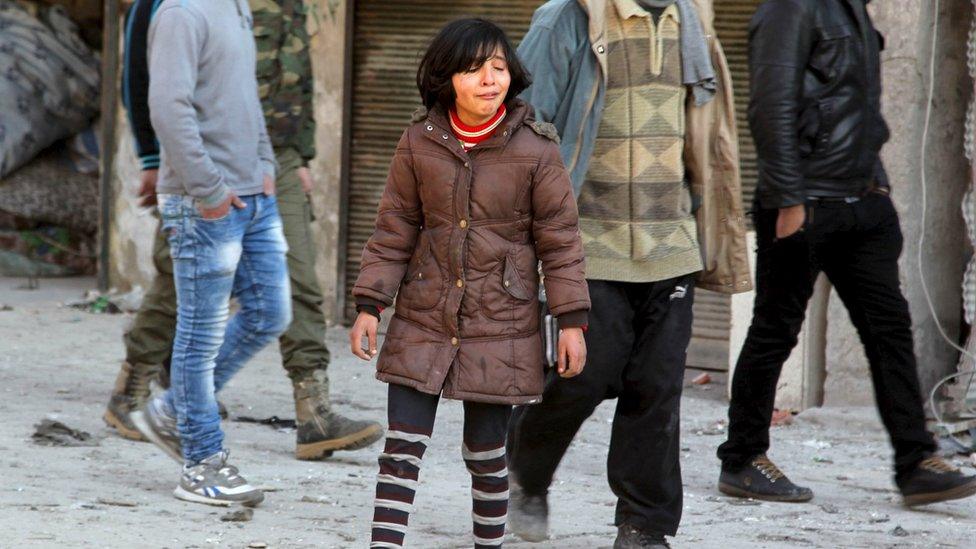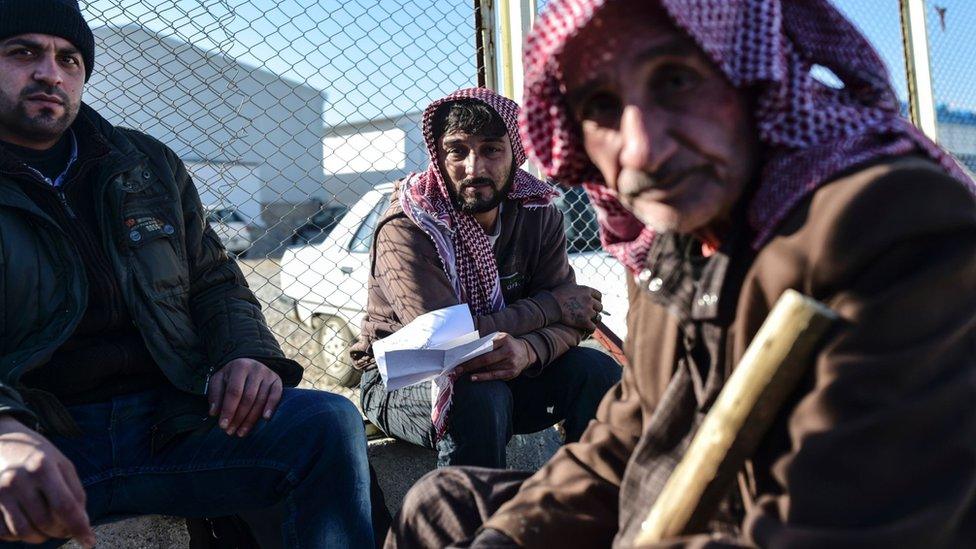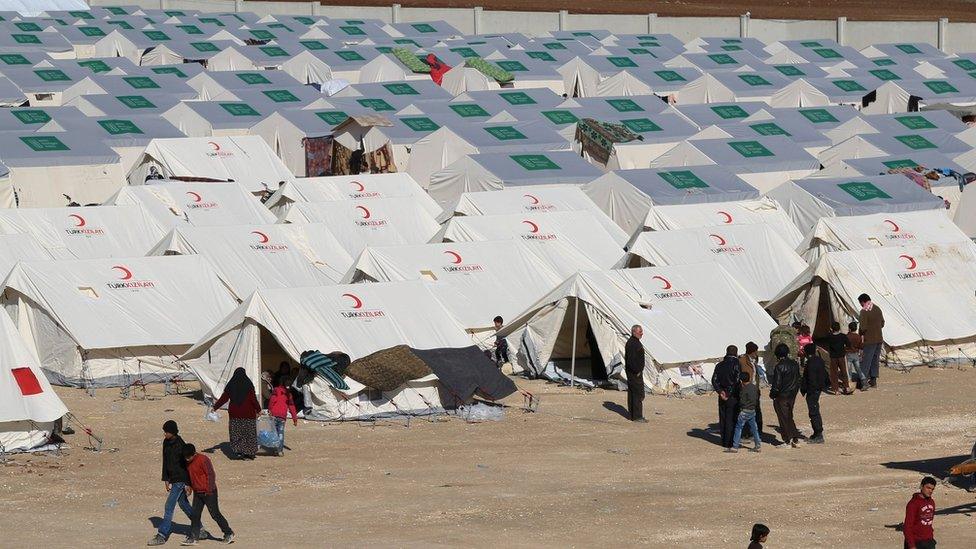Syria conflict: UN fears Aleppo assault could cut off 300,000 civilians
- Published

Aleppo is divided in roughly two, with the government controlling the west and rebels the east
Up to 300,000 people could be cut off from food supplies if Syrian government forces encircle rebel-held parts of the northern city of Aleppo, the UN says.
A road from Turkey used by the World Food Programme to reach eastern Aleppo was blocked last week after the government launched a major offensive.
The agency currently has an alternative route, but it may soon be severed too.
The UN is also calling on Turkey to let in some 30,000 people stranded on its border who have fled the fighting.
Aid workers say facilities at the border have been overwhelmed, with people forced to sleep outside in the bitter winter weather.
'No more capacity' for Syrian refugees in Turkey
Separately, Medecins Sans Frontieres said air strikes had hit a hospital, external supported by the aid agency near the southern city of Deraa, killing three people and injuring six others, including a nurse.
The strike on the Tafas field hospital, some 12km (7 miles) from the Jordanian border, took place on the night of 5 February. It caused partial damage to the hospital building, and put its ambulance service out of action.
Aleppo, once Syria's commercial and industrial hub, has been roughly divided since 2012, with the government controlling the western half and rebel factions holding the east.
Eight days ago, the Syrian army and allied militias, backed by Russian air strikes, began an offensive north-west of Aleppo that swiftly broke a long-running siege of two pro-government towns and severed a key rebel supply route into the city.
They then advanced towards the Turkish border, and by Monday were reportedly only 25km (16 miles) away - the closest they have been since late 2013.

The Syrian war and Aleppo

March 2011: Anti-government protests erupt across Syria, but Aleppo is initially untouched as a result of a state crackdown
February 2012: As the rebellion turns into a conflict, clashes between rebels and the government are reported with increasing frequency in Aleppo province
July 2012: The battle for Aleppo begins. Rebels make swift advances, but are unable to consolidate their gains and the city becomes divided
2013: The government begins bombarding rebel districts with barrel bombs, causing thousands of casualties
September 2015: Syria launches a fresh offensive in the wake of Russia's intervention in the conflict
February 2016: The government captures towns north of Aleppo, threatening to encircle the city

Meanwhile US Secretary of State John Kerry on Tuesday warned that Russia's aerial bombardment of Syrian opposition targets could destroy efforts to bring Syria's civil war to a conclusion.
"Russia's activities in Aleppo and in the region right now are making it much more difficult to be able to come to the table and... have a serious conversation," Mr Kerry said.

The UN refugee has called on Turkey to immediately allow in Syrians fleeing Aleppo

The World Food Programme has begun distributing aid at temporary camps inside Syria
"We call on Russia again to join in the effort to bring about an immediate ceasefire and to bring about full humanitarian access."
Mr Kerry is due to meet his Russian counterpart Sergei Lavrov in Munich on Thursday at a gathering of the 17-nation contact group which is being convened with the aim of getting peace talks on track.
Syria for its part has insisted that it will continue with its objective of securing the border with Turkey and recapturing Aleppo, a top adviser to President Bashar al-Assad told the Reuters news agency on Tuesday.
Bouthaina Shaaban said that her government had little optimism that diplomatic efforts would succeed in ending the five-year civil war.
She said that support for a ceasefire came from countries that did "not want an end to terrorism" and instead wanted to help insurgents who are losing territory.

Rebels and opposition activists said they feared the government would soon attempt to sever their last route into eastern Aleppo from Turkey, which runs from the western Bab al-Hawa crossing.
The government has employed so-called "starve or surrender" tactics elsewhere in the country to regain rebel-held territory, most notably in the central city of Homs.
The UN Office for the Co-ordination for Humanitarian Affairs (OCHA) , external that such a move might leave up to 300,000 people cut off from humanitarian aid, unless access could be negotiated.
A spokeswoman for the World Food Programme , external reporters in Geneva that it was "extremely concerned about the situation on the ground".
The UN refugee agency has meanwhile called on Turkey to immediately allow them in.
Turkey's Foreign Minister Mevlut Cavusoglu said it had so far let in 10,000 of those waiting at Bab al-Salam, and would continue to do so in a "controlled fashion".
Turkey has accepted 2.5 million refugees since the uprising against President Bashar al-Assad almost five years ago.